
Guide to Buying an Apartment in Nairobi
Author: Admin, Gertler Investment Limited
2025-03-06 13:18:46
Step-by-Step Guide to Buying an Apartment in Nairobi
Thinking about buying an apartment in Nairobi? Whether you're an investor or looking for a home, understanding the process can save you time, money, and stress. Here’s a detailed step-by-step guide to help you navigate the journey smoothly.
Step 1: Gather Your Requirements
Before you start looking at properties, ensure you have the necessary documents:
✅ For Kenyan citizens: A Kenyan ID or passport and a KRA PIN.
✅ For foreigners: A valid passport and a KRA PIN (if you don’t have one, we can assist you in obtaining it within 24 hours).
✅ Finances: Whether you’re paying in cash or through a payment plan, you’ll need a budget that aligns with your investment goals.
Step 2: Find a Trusted Real Estate Agent
Navigating the Nairobi real estate market alone can be overwhelming. A reliable realtor will:
✔️ Help you identify properties that fit your budget, preferences, and location.
✔️ Offer insights on prime investment locations with the highest return potential.
✔️ Connect you to developers with verified projects.
A good agent ensures you don’t fall into the trap of fake listings or unverified properties.
Step 3: Property Selection & Offer Letter
Once you find a property that fits your needs, the developer will issue an offer letter. This letter:
🔹 Serves as a reservation document, giving you time to conduct due diligence.
🔹 Outlines the price, payment plan, and other terms.
🔹 Comes with due diligence documents about the developer and property.
At this point, you’re not legally tied to the purchase, so take your time to review everything.
Step 4: Conduct Due Diligence
This is a critical step to ensure you’re buying a legally sound property. Here’s what to check:
✅ Developer’s Background:
- Are they registered in Kenya?
- Do they have a track record of completed projects?
- Any legal disputes or project delays in the past?
✅ Property Ownership & Approvals:
- Does the developer legally own the land?
- Are NCA (National Construction Authority) approvals in place?
- Have all development approvals been obtained?
💡 Pro Tip: Always work with a conveyancing lawyer to verify these details. If you don’t have one, we can connect you with experienced real estate lawyers.
If you need more time for due diligence, some developers allow you to place a refundable reservation deposit to secure your unit before committing.
Step 5: Signing the Sale Agreement
Once due diligence is complete and everything checks out, the developer will issue a draft Sale Agreement. This document legally binds the transaction.
At this stage, you should:
✔️ Negotiate & confirm your preferred payment plan (monthly, quarterly, or bi-annual).
✔️ Review the clauses carefully, ensuring your rights are protected in case of:
- Defects in the unit
- Delays in project completion
- Refunds and dispute resolution
✔️ Sign & submit the agreement after lawyer approval.
💡 Tip: Ensure the agreement clearly states timelines for completion and what happens in case of delays.
Step 6: Making Payments
Now that the sale agreement is signed, you’ll need to start making payments as per the agreed plan. Payments can be structured as:
🔹 Installments (monthly, quarterly, or bi-annual).
🔹 Mortgage financing (if applicable).
🔹 Lump-sum payment for those paying in full.
Once your payments are complete, you’re now ready for the handover process!
Step 7: Handover & Final Payments
Once the apartment is ready for occupation, the developer will:
✔️ Issue a Handover Notice – This informs you that the unit is complete and ready for inspection.
✔️ Require you to clear all remaining balances & closing costs.
Closing Costs Include:
📌 Stamp Duty: 4% of the property value.
📌 Legal Fees: 1% of the property value.
📌 Utility Bills: Advanced service fees, electricity, and water meter installation costs.
Step 8: Inspect Your Unit Before Handover
Before taking possession of your apartment, inspect the property and note any issues with:
🛠️ Paintwork, flooring, doors, locks, plumbing, electrical fittings, etc.
If there are any defects, the developer must fix them within a 6-month defect liability period, which officially starts after the architect issues the Practical Completion Certificate.
💡 Tip: Ask when the defect liability period starts—it may begin before handover.
Step 9: Final Handover & Moving In
Once all issues are fixed:
✅ Sign the Handover Document.
✅ Receive your keys, access cards, and electricity token card.
✅ Move in or rent it out as you wait for your sectional title.
Step 10: Sectional Title Processing
After the property is handed over, the developer will apply for sectional titles, which can take up to 6 months. However, this doesn’t affect your ownership—the unit is legally yours after completion.
💡 Tip: If buying for investment, you can rent out the unit immediately after handover.
Final Thoughts
Buying an apartment in Nairobi doesn’t have to be complicated. With the right guidance, legal checks, and payment plan, you can secure a great property stress-free.
📩 Need assistance finding the right property or legal help? CONTACT US ON +254712054154 or use this link to get in touch with us on whatsapp link Comment "BUYING GUIDE" and we’ll share our expert checklist to help you get started! 🚀🏡